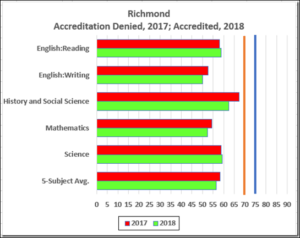
John Butcher offers a more severe assessment of the Virginia Department of Education’s new accreditation policy than I do. Last year, 19 of 44 Richmond schools were denied accreditation, he notes. This year, all Richmond schools (indeed all Virginia schools) are accredited — even though assessment scores deteriorated last year. Here’s what he has to say on Cranky’s Blog:
How did the Board of “Education” produce these bizarre results?
It all goes back to Petersburg, which has been operating under Memoranda of Understanding since 2004 and which was denied accreditation for 2006. And has been denied accreditation ever since.
The Board has demonstrated beyond doubt that it does not know how to fix Petersburg (and admitted as much…). Faced now with the ongoing Petersburg debacle and with accreditation disasters in Richmond and elsewhere, the Board punted: They adopted a new, emasculated accreditation regulation.
I commented on that regulation at the proposal stage, pointing out, inter alia, that the changes “make it almost impossible for a school to be denied accreditation.”
To read the entire regulation is to earn a PhD in masochism. … Blessedly, the important parts are short:
- If a school does not meet a standard and does not come close to meeting it (the regulation dilutes the 75%/70% benchmarks to 66%) for four consecutive years, it falls to performance Level Three.
- A school at Level Three must develop a “corrective action plan.”
- If a school (or division) fails to adopt and implement a corrective action plan “with fidelity,” it can be denied accreditation.
In short, in order to lose accreditation, a school must foul up badly for four consecutive years and then tell the Board to go to hell.
That is not a problem, however; that is a feature. The regulation imposes a sterile paperwork smokescreen to hide the Board’s incompetence as to the inadequate schools in Petersburg and Richmond (and elsewhere). And, not at all beside the point, to make the Board and all those awful schools look better than they are in fact.

Leave a Reply
You must be logged in to post a comment.